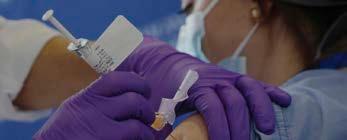
19 minute read
Publications & Communications
An organization committed to global impact depends on strong relationships with the world’s leading media organizations. Much of our research reaches the public through broadcast and print interviews with our scholars, and the pieces of commentary they write.
The Center had a strong year sharing insights via commentary and interviews. Leading websites and newspapers published more than 330 pieces of analysis and opinion from our scholars in 2021, including two dozen in the nation’s most-competitive outlets: The New York Times, The Wall Street Journal, and The Washington Post.
Center scholars also hosted 272 events during this stretch, published 73 reports and papers, and testified before the U.S. Congress four times. With both in-person and online attendees, our events continued to attract strong interest, including from top journalists around the world. With nearly 278,000 page views a month (a 21% annual increase) along with a time-on-research page average of over three minutes, BelferCenter.org continues to be a leading source of relevant research for policymakers, government officials, academics, students, and the media.
Some of the most-read reports from the past year include The Coming AI Hackers by Bruce Schneier, Mass. Vaccine Report Card by Graham Allison and Hugo Yen, and Avoiding a Plastic Pandemic: The Future of Sustainability in a Post-COVID-19 World by Nicola De Blasio and Phoebe Fallon. The Center produced timely responses to major events in 2021, including the U.S. withdrawal from Afghanistan, Russia’s saber-rattling against Ukraine, as well as the ongoing pandemic.
Our presence on social media continued to expand this year. Our Twitter followers increased 14%, to 32,814, while our Facebook likes grew 8% to 15,996. Drawing on the strength of our timely videos responding to global news and trends, along with evergreen content that continues to draw strong organic search traffic, our lifetime YouTube views reached 3,261,755, a yearly gain of 20%. As we featured more of our work training tomorrow’s leaders, the Center’s LinkedIn profile grew by 165% to 11,679 followers. We also invested in new podcasts, including Northern Lights, IS: Off the Page, Middle East Matters, and Immutable. Collectively, these programs generated more than 20,000 downloads.
The following pages of publication listings provide a glimpse of the extraordinary range and influence of the Center’s scholars.
For Students For the Press About Subscribe Contact Us Directory
Research * Experts Programs & Projects * Fellowships Events +
Brian Snyder/Pool via AP
Catalina Gonzalez-Marques, an emergency medical physician, receives the Pfizer-BioNTech coronavirus vaccine at Brigham and Women's Hospital, Wednesday, Dec. 16, 2020, in Boston.
+ SHARE ANALYSIS & OPINIONS - Belfer Center for Science and International Affairs, Harvard Kennedy School
Massachusetts Vaccine Report Card
Authors: Graham Allison, Hugo Yen | Feb. 09, 2021
That Massachusetts has been stumbling in its attempt to meet the challenge posed by COVID-19 is not news. Many readers may, however, be surprised when they see the Massachusetts Report Card below. Among the 50 states in the union, on three of the four key performance measures, Massachusetts is currently earning an F.
Grim statistics about this killer disease have been repeated so often that they become numbing. But we should never forget that every one of the 2.3 million deaths to date was someone’s mother or father, sister or brother, colleague or friend. So too with our 460,000 fellow Americans who were alive when coronavirus arrived in the United States 12 months ago but are now gone.
The tragic fact is that most of these deaths were unnecessary. To put the point more provocatively: most of these deaths would not have occurred if our federal and state governments had taken actions they could have—but failed to do.
Since we understand that this is an incendiary charge, let us explain why. Because our nation’s performance has been so appalling, under former President Trump, Washington did everything it could to deny the relevance of comparisons of our results with those of other nations. Nonetheless, it is a simple fact that Singapore, with a population essentially the same as that of Massachusetts has had only 29 deaths. Taiwan with a population three times the size of Massachusetts has allowed only 9 deaths. And South Korea, with a population of 52 million, including 28,500 American servicemen, has experienced only one fiftieth the deaths per capita of the USA.
CYBER PROJECT × COUNCIL FOR THE RESPONSIBLE USE OF AI
For Students For the Press About Subscribe Contact Us Directory
Research ( Experts Programs & Projects ( Fellowships Events )
The Coming AI Hackers
Bruce Schneier
A Hard Look at What Happened in Afghanistan
The United States kept forces in Afghanistan far longer than the British did in the 19th century, and twice as long as the Soviets — with roughly the same results, write David E. Sanger and Helene Cooper.
READ MORE
AP Photo/Rahmat Gul
In the Spotlight
ENVIRONMENT AND NATURAL RESOURCES PROGRAM
AP Photo/Rahmat Gul
Easier to Get into War Than to Get Out: The Case of Afghanistan Dr. Nazanin Azizian Avoiding a Plastic
ESSAY APRIL 2021 Pandemic The U.S. should accept with humility its inability to fully eliminate terrorism.
AP Photo/Noah Berger, File
Climate Change Uncertainty has Been Eclipsed by Political Uncertainty
Joel Clement
The report reminded us that stabilizing warming will require net-zero emissions.
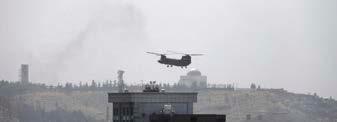
The Future of Sustainability in a Post COVID-19 World
MORE ON U.S. FOREIGN POLICY MORE FROM JOEL CLEMENT
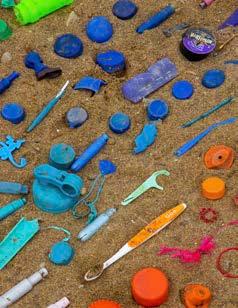
Nicola De Blasio Phoebe Fallon
Meet Our Experts
Eric Rosenbach
The Limits of Cyberoffense Telling Black Stories: What We All Ca… The Election Influence Operations Pl…
Featured Events
INFORMATION SESSION • Open to the Public
Climate@HKS Virtual Open House
Thu, Aug 26, 2021 | 3:00pm
Kiyoshi Ota/Pool via AP
Why the Quad Alarms China
Kevin Rudd
So far, Beijing has struggled to mount an effective response to the Quad challenge.
MORE FROM KEVIN RUDD
Most Viewed
AP Photo
How the US funds the Taliban
Explore
Settings
Belfer Center
19.1K Nweets
Follow
Belfer Center
ABelferCenter
The hub of research, teaching, and training in international security affairs,
environmental and resource issues, and science and technology policy.
Cambridge, MA belfercenter.org Joined November 2009
783 Following 33.3K Followers
Xweets !weets & replies Media Likes
Belfer Center ABelferCenter · 7m
Wedge strategy theory explains how states use strategic arms control to
divide adversaries by affecting trust, threat perceptions, & beliefs about
trade-offs, Timothy Crawford & AKhangXVu write, citing 3 landmark arms
control negotiations. AJournal_IS
belfercenter.org
Arms Control as Wedge Strategy: How Arms Limitation Deals Divide A…
Wedge strategy theory explains how states use strategic arms control
to divide adversaries by affecting their trust, threat perceptions, and …
beliefs about a commitment’s trade-offs. Examining three...
1 1
Belfer Center Retweeted
Environment & Natural Resources Program ABelferENRP · 5h
"The time has passed for environmental economists to think about climate
policy only in terms of carbon pricing instruments." - ARobertStavins talks
about the future of environmental economics and advice for young
researchers w/ AIng_Schumacher
Ingmar Schumacher AIng_Schumacher · 11h
I am very happy to present to you my new Meet Top Environmental
Economists interview with Robert Stavins. AEAERE_envecon
ARobertStavins AAereOrgingmarschumacher.com/2022/01/11/mee…
7 4
Belfer Center ABelferCenter · 1h
Although relatively prosperous and stable, the mid-Euphrates region of Iraq
has not been successful in producing a civil society that promotes and
produces democratic growth, writes . In a new report, sheAMarsinRA
explores the forces behind this.
brookings.edu
Postwar development of civil society in Iraq’s mid-Euphrates region
Legacies of war and authoritarianism continue to shape civil society
formation in southern Iraq, Marsin Alshamary writes in this report, …
which provides a sub-national case study of civil society in...
1
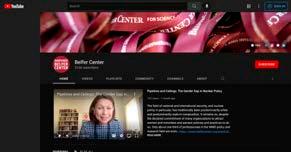
Jeff Fields
Increasing Diversity in the Intelligen… Agents of Change: Driving a More Di…
MORE EVENTS
Rene Magritte
Whose Streets? Our Streets! (Tech Edition)
Belfer Center ABelferCenter · 4h
China’s national emissions trading system started operation in 2021.
However, there are critical challenges to overcome before an ETS can fulfill
its potential.
This workshop addressed those challenges & provided comparisons w/
other Asian countries:
Kathy Pham
Want to fix big tech? Change what cl… 2018 State of Digital Transformation
PAPER
JANUARY 2021
AP Photo/Rahmat Gul
Easier to Get into War Than to Get Out: The Case of Afghanistan
MORE EXPERTS
belfercenter.org
Harvard Project Conducts Research Workshop on China's National E…
The Harvard Project conducted a joint research workshop in October
2021, “ETS and the power sector in China and other Asian countries: …
interactions, design, and operation.” Co-organizers were the...
Security Diplomacy Energy & Environment Science & Technology
1
Belfer Center ABelferCenter · 5h
"Ensuring consistency between signals and actions is much more likely to Search Nwitter New to 'witter? Sign up now to get your own personalized timeline!
Sign up with Google
Sign up with Apple Sign up with phone or email
By signing up, you agree to the Terms of Service and Privacy Policy, including Cookie Use.
For those who live here in Massachusetts, that means that if our fellow Bay Staters who died in the past year from COVID-19 had relocated to Taiwan or Singapore or Seoul this time last year, theyYou might like would be alive on this earth today. While certainly not the only reason, President Trump’s blatant Harvard Kennedy … AKennedy_School Follow failure to meet the coronavirus challenge certainly contributed to his being fired in the November election.AEI Foreign Policy AAEIfdp Follow
International comparisons aside, within these United States, 50 state governors, their health departments, and health providers each face an essentially equivalent challenge from this deadly The Wilson Center ATheWilsonCenter Follow virus. In combatting it, many are doing significantly better than others. To sharpen the point once Show more more, had many of those who were killed by coronavirus in the past year moved from the state in which they had lived to one of the other states in the country, they would now be alive.What’s happening
Jobs Harvard's Belfer Center Worldwide Join now Sign in
One of the great strengths of the American system of government is that our 50 states areUS national news · This morning “laboratories of democracy.” Lessons learned in one in reducing infant mortality, promoting racialTrending now: it’s National Milk Day; Sierra Leon returns to harmony, or maintaining highways can be adapted and applied in others. Our 50 states are alsoAFCON; Maya Angelou appears
on the quarter
competitors, indeed fierce competitors. They compete in attempting to persuade their citizens not to move elsewhere. They tout the advantages of their state, sometimes even providing tax incentives, toVinyl outsold CDs in the US for ·Quartz 4 hours ago attract major businesses to locate their headquarters and manufacturing plants there. They competethe first time in decades to attract talented individuals in the hope that they will create new enterprises that will produce well-paying jobs for their residents. Indeed, they’ve even been known to persuade star athletes toTop universities colluded to limit
student financial aid, lawsuit
“come home to Cleveland,” as Ohio did in the case of LeBron, raising the Cavaliers from the bottomalleges to a championship in the NBA—or even to try to persuade Tom Brady to stay.
So if we compare the states to 50 runners in a series of marathons, we can see who is leading—as well as who is bringing up the rear. In the first race to protect the lives of its citizens and thus have the fewest deaths per capita, at this point Massachusetts has fallen so far behind that it is almost impossible for it to catch up. But in the second, the race to use the vaccines delivered to it weekly to vaccinate its citizens, every day Governor Baker, his Secretary of Health and Human Services, and the health providers are making decisions that can move this needle. If tomorrow, and the day after, and the week after that we run faster in this marathon, we will move up in the race for the highest percentage of our population vaccinated. Moreover, if the governor and his team are able to do that, they can advance the date in which we’ve reached the level of vaccinations that will allow us to return to something closer to normal.
In sum, in this marathon, cheering from the sidelines, we should all be shouting our words of encouragement: run, Charlie, run. Personally, I look forward to the day when our state’s report card will show A’s rather than F’s.
The Wall Street J… · 5 hours ago MMA · Trending
Colby
Similar pages
Harvard's Belfer Center Think Tanks Cambridge, MA · 12,395 followers View all 164 employees
Follow Council on Foreign Relations Think Tanks New York, NY The Brookings Institution Think Tanks Washington, DC Center for Strategic and International Studies (CSIS) Think Tanks Washington, DC Carnegie Endowment for International Peace
Trending with Masvidal Celebrities · Trending
Ben Barnes
4,743 Nweets Show more Terms of Service Privacy Policy Cookie Policy Accessibility Ads info © 2022 Nwitter, Inc. About us The Belfer Center for Science and International Affairs is the hub of Harvard Kennedy School's research, teaching, and training in international security and diplomacy, environmental and resource issues, and science and technology policy. From terrorism and nuclear weapons to cybersecurity, climate change, energy, and diplomacy, the Belfer Center provides research, ideas, and leadership for More a more secure, peaceful world. Directed by former Secretary of Defense Ash Carter and former Pentagon cyber czar Eric Rosenbach, the Center has been ranked the world's #1 University Affiliated Think Tank each year since 2014. The Center has a dual mission: (1) to provide leadership in advancing policy-relevant knowledge about the most important challenges of international security and other critical issues where science, technology, environmental policy, and international affairs intersect; and (2) to prepare future generations of leaders for these arenas. The heart of the Belfer Center is its resident research community of more than 150 scholars, who through publications and policy discussions, workshops, seminars, and conferences, promote innovative solutions to significant international challenges.
Think Tanks Washington, DC Show more similar pages Browse jobs Intelligence Analyst jobs 22,892 open jobs Cost Analyst jobs 37,591 open jobs Analyst jobs 732,712 open jobs Intern jobs 65,057 open jobs Editorial Assistant jobs 30,896 open jobs
Receive our latest updates: https://belfercenter.org/subscribe Director Of Communications jobs
18,606 open jobs
Follow us on Twitter: https://twitter.com/BelferCenter Policy Analyst jobs
7,217 open jobs
Like us on Facebook: https://facebook.com/belfercenter
Watch us on YouTube: https://youtube.com/BelferCenter
See us on Instagram: https://instagram.com/belfercenter
Listen to us on SoundCloud: https://soundcloud.com/belfercenter Policy Consultant jobs
2,056 open jobs
Director jobs
1,231,102 open jobs
Delivery Manager jobs
231,960 open jobs
Website https://belfercenter.org Show more jobs like this
P.S. Footnote: Grades are assigned on a curve in which the top 10 are awarded A’s and the bottom 10 F’s.
Enlarge
Industries Think Tanks Company size 51-200 employees Headquarters Cambridge, MA
Type Educational Institution
For more information on this publication: Belfer Communications OfficeFounded 1971 For Academic Citation: Specialties Allison, Graham and Hugo Yen.“Massachusetts Vaccine Report Card.” Belfer Center for Science and International Affairs,international affairs, climate change, policy, science, defense, Harvard Kennedy School, February 9, 2021.technology, international security, cybersecurity, environment, innovation, natural resources, diplomacy, international relations, energy, nuclear warfare, nuclear terrorism, globalization, and geopolitics
Alexander, Douglas. “COP26 in Glasgow is our last best hope.” Belfer Center for Science and International Affairs, Harvard Kennedy School. October 16, 2021.
Allison, Graham. “An Unsentimental China Policy.” Foreign Affairs, February 18, 2021.
Anadon, Laura, John P. Holdren, Henry Lee, Halla Hrund Logadóttir and Robert N. Stavins.“Takeaways from COP26 in Glasgow.” Belfer Center for Science and International Affairs, Harvard Kennedy School, Fall 2021.
Baek, Jieun. “A Policy of Public Diplomacy with North Korea.” Applied History Project. Paper, Belfer Center for Science and International Affairs, Harvard Kennedy School. August 2021.
Barsallo Lynch, Maria, Eric Rosenbach, Robby Mook, Austin Boral, Amina Edwards, Stefani Jones and Kunal Kothari. “Beyond 2020: Policy Recommendations for the Future of Election Security.” Report, Defending Digital Democracy, Belfer Center for Science and International Affairs, Harvard Kennedy School. February 2021.
Bersin, Alan. “Migration Management and Border Security: Lessons Learned.” Policy Brief, Migration Policy Institute, September 2021.
Bilmes, Linda and Margaret Bourdeaux.“Massachusetts Should Pay People to Quarantine.” The Boston Globe, March 3, 2021.
Brooks, Vincent K. and Ho Young Leem. “A Grand Bargain With North Korea.” Foreign Affairs, July 29, 2021.
Bruggeman, Nate (editor), Stephen Couthart and Ryan Riccucci. “Improving Big Data Integration and Building a Data Culture for U.S. Border Security.” Paper, Belfer Center for Science and International Affairs, Harvard Kennedy School. March 25, 2021. Budjeryn, Mariana and Amb. Thomas Graham Jr. “Neither NATO, Nor Nukes: The Answer to Ukraine’s Security is a Strategic Alliance with the United States.” Just Security, May 20, 2021.
Bunn, Matthew. “Twenty Years After 9/11, Terrorists Could Still Go Nuclear.” Bulletin of the Atomic Scientists, September 16, 2021.
Burns, Nicholas, Erika Manouselis, and Cathryn Clüver Ashbrook (editors). “A Decade of Diplomacy: The Future of Diplomacy Project at 10.” Report, Belfer Center for Science and International Affairs, Harvard Kennedy School, Autumn 2021.
Carter, Ash. “Afghanistan: A Conversation with Ash Carter.” Belfer Center for Science and International Affairs, Harvard Kennedy School, October 7, 2021.
Chenoweth, Erica. Civil Resistance: What Everyone Needs to Know. New York, NY: Oxford University Press, 2021.
Russell, Cristine. “For more than four decades, Professor Bill Clark has championed sustainability.” Harvard Kennedy School Magazine, Winter 2021.
Clement, Joel. “Fossil Fuels and Public Lands: How the U.S. Interior Department Can Act on Climate Right Now.” Union of Concerned Scientists, April 6, 2021.
Clüver Ashbrook, Cathryn and David E. Sanger. “Transatlantic Action Plan: Technology.” Policy Brief, Project on Europe and the Transatlantic Relationship and the German Council on Foreign Relations, February 2021.
Cohen, Dara Kay and Ragnhild Nordås. “Conflict-Related Sexual Violence.” Annual Review of Political Science, Vol. 24. (May 2021): 193–211. De Blasio, Nicola, Fridolin Pflugmann, Henry Lee, Charles Hua, Alejandro NuñezJimenez and Phoebe Fallon. “Mission Hydrogen: Accelerating the Transition to a Low Carbon Economy.” Edited by Nicola De Blasio. Report, Belfer Center for Science and International Affairs, Harvard Kennedy School, October 29, 2021.
Dobriansky, Paula.“A Way Out of Biden’s Afghan Trap.” The Wall Street Journal, August 25, 2021.
Ferguson, Niall. Doom: The Politics of Catastrophe. New York: Penguin Press, 2021.
Frankel, Jeffrey.“The G20 Agenda, As the Pandemic Continues.” Views on the Economy and the World, August 28, 2021.
Gallagher, Kelly. “The Net Zero Trap.” Foreign Affairs, September 30, 2021.
Giovannini, Francesca. “The CTBT at 25 and Beyond.” Arms Control Today, (September 2021).
Holdren, John P. “Climate Change is Rapidly Transforming the Arctic: Why Everybody Should Care.” The Hill, June 9, 2021.
Khouri, Rami, Karen Elliott House and Meghan L. O’Sullivan. “Center Scholars on Recalibrating U.S.-Saudi Relations After Khashoggi Report Release.” News, Belfer Center for Science and International Affairs, Harvard Kennedy School, March 4, 2021.
Hilgartner, Stephen , J. Benjamin Hurlbut, and Sheila Jasanoff. “Was ‘Science on the Ballot?” Science, vol. 371. no. 6532. (February 26, 2021): 893–894.
Kayyem, Juliette. “The Pandemic Is Ending With a Whimper.” The Atlantic, November 24, 2021.
Keith, David. “What’s the Least Bad Way to Cool the Planet?” The New York Times, October 1, 2021.
Kolbe, Paul, Sean Power and Calder Walton. “Report: Climate Change, Intelligence, and Global Security.” Report, Intelligence Project, Belfer Center for Science and International Affairs, Harvard Kennedy School. May 2021.
Krebs, Chris. “Chris Krebs Named Senior Fellow at Harvard Kennedy School’s Belfer Center.” Belfer Center for Science and International Affairs, Harvard Kennedy School, July 29, 2021.
Lee, Henry, Daniel Schrag, Matthew Bunn, Michael Davidson, Wei Peng, Pu Wang and Zhimin Mao. Foundations for a Low-Carbon Energy System in China. Cambridge, England: Cambridge University Press, December 2021.
Li, Chris and Nathan Levine. “Pathogens Have the World’s Attention: The United States Should Lead a New Push Against Bioweapons.” Foreign Affairs, March 16, 2021.
Logadóttir, Halla Hrund and Ulla HemminkiReijonen. “Reinventing Climate Change Education.” Paper, Belfer Center for Science and International Affairs, Harvard Kennedy School, October 2021.
Logevall, Fredrik.“How America Lost Its Way in Afghanistan.” The New York Times, August 16, 2021.
Madad, Syra and Saskia Popescu. “How to Make Holiday Gatherings Safer: 6 Things to Keep in Mind.” Belfer Center for Science and International Affairs, Harvard Kennedy School, October 25, 2021.
Miesen, Mike and Laura Manley. “Building a 21st Century Congress: A Playbook for Modern Technology Assessment.” Paper, Belfer Center for Science and International Affairs, Harvard Kennedy School. June 2021.
O’Neil, Siobhan and Zoe Marks. “The Politics of Repatriation and Power of Community Reintegration in Peacebuilding.” Just Security, August 31, 2021. Masoud, Tarek, A.Kadir Yildirim and Peter Mandaville. “Will the pandemic spark a religious revival in the Muslim world?” The Washington Post, April 2, 2021.
Miller, Steven E. “Nuclear Hotlines: Origins, Evolution, Applications.” Journal for Peace and Nuclear Disarmament, vol. 4. no. sup1. (2021): 176–191 .
Narayanamurti, Venkatesh and Jeffrey Y. Tsao. The Genesis of Technoscientific Revolutions: Rethinking the Nature and Nurture of Research. Cambridge, Mass.: Harvard University Press, November 2021
Nye, Joseph S. Jr. “Our AI Odyssey.” Project Syndicate, November 26, 2021.
O’Sullivan, Meghan. “There’s No Hurry for Biden to Re-Enter the Iran Nuclear Deal.” Bloomberg Opinion, March 25, 2021.
Pandith, Farah and Jacob Ware. “Radicalization in America Requires A New Plan: Biden Has A Good One.” Belfer Center for Science and International Affairs, Harvard Kennedy School, June 21, 2021.
Poneman, Daniel and Sahar Nowrouzzadeh. “The Deal That Got Away: The 2009 Nuclear Fuel Swap with Iran.” Report, Belfer Center for Science and International Affairs, Harvard Kennedy School. January 2021.
Rosenbach, Eric and Gregory Falco. Confronting Cyber Risk: An Embedded Endurance Strategy for Cybersecurity. New York, NY: Oxford University Press, December 2021.
Sanger, David, Steven Erlanger and Farnaz Fassihi. “U.S. and Iran Agree to Indirect Talks on Returning to Nuclear Deal.” The New York Times, April 2, 2021.
Saradzhyan, Simon, “Why Russia Is Unlikely to Use Zapad-2021 to Intervene Militarily in European Countries,” Program on New Approaches to Research and Security in Eurasia, August 31, 2021 Schneier, Bruce. “The Coming AI Hackers.” Paper, Belfer Center for Science and International Affairs, Harvard Kennedy School. April 2021.
Schrag, Daniel. “Biden Must Hold Fast on Climate Standards.” The Boston Globe, January 21, 2021.
Stavins, Robert N. “Domestic Challenges Could Limit New U.S. Climate Policy.” East Asia Forum Quarterly, January–March 2021.
Taussig, Torrey. “A Common Front on China? A View from the United States.” Internationale Politik Quarterly, March 31, 2021.
Tobey, William.“Nuclear Safety and Security Lessons from Chernobyl and Fukushima.” Bulletin of the Atomic Scientists, March 11, 2021.
Ulmer, Fran. “Together Toward a Sustainable Arctic.” Belfer Center Newsletter, Belfer Center for Science and International Affairs, Harvard Kennedy School. Spring 2021
Walt, Stephen M. “China Wants a ‘Rules-Based International Order,’ Too.” Foreign Policy, March 31, 2021.
Walton, Calder, Sean Power and Michael Miner. “Report - 9/11: Intelligence and National Security Twenty Years Later.” Belfer Center for Science and International Affairs, Harvard Kennedy School, September 23, 2021.
Zabierek, Lauren, Felipe Bueno, Andrew Sady-Kennedy, Ngasuma Kanyeka and Graham Kennis. “Toward a Collaborative Cyber Defense and Enhanced Threat Intelligence Structure.” Paper, Belfer Center for Science and International Affairs, Harvard Kennedy School. August 2021.
Student Opportunities
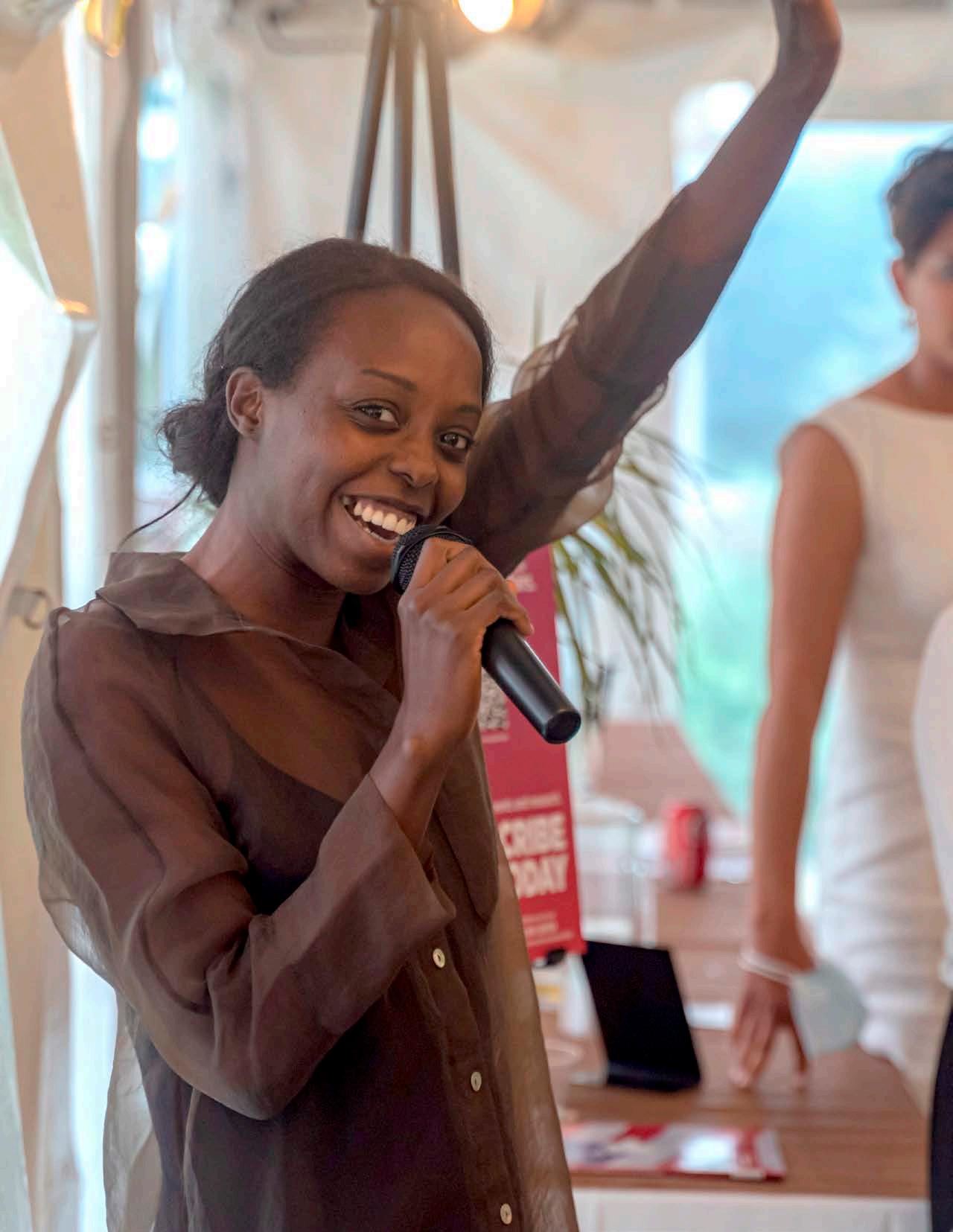
September 14, 2021: MPA candidate Khadija Saleh promotes



